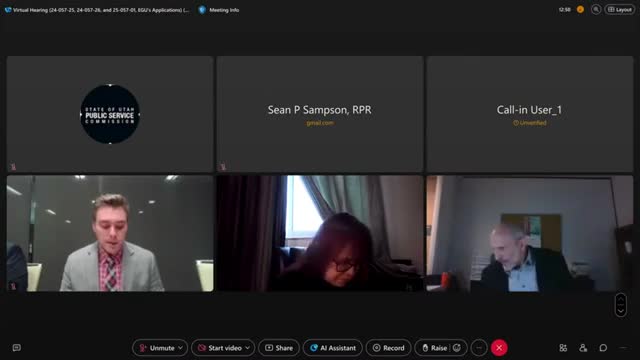Utah PSC hearing: Enbridge seeks $17.4 million pass-through rate decrease; Division backs interim approval

Summary
Enbridge Gas Utah asked the Utah Public Service Commission on Jan. 24 to approve a net decrease of $17,391,911 in Utah natural gas rates in docket 25-057-01, a pass-through filing the company said stems from an overcollection in its 191 amortization account.
Enbridge Gas Utah asked the Utah Public Service Commission on Jan. 24 to approve a net decrease of $17,391,911 in Utah natural gas rates in docket 25-057-01, a pass-through filing the company said stems from an overcollection in its 191 amortization account.
The company’s regulatory analyst, Austin Stewart, told the commission the 191 account was overcollected by about $60 million and that Enbridge proposes to amortize that balance, producing a credit amortization and an overall bill decrease. "If this application is approved, a typical Utah GS customer using 70 dekatherms per year would see a decrease of $10.2 or a total annual decrease of about 1.54%," Stewart said.
Why it matters: The pass-through mechanism (the company’s 191 account) returns collected commodity and supplier-non-gas cost variances to customers; the Division of Public Utilities (DPU) told the commission its review shows the request represents just and reasonable rates and recommended interim approval on Feb. 1, 2025, while the division completes its audit.
Supporting details: Enbridge submitted corrected numeric entries to its filing (examples: $10.5 changed to $10.2; 1.55% changed to 1.54%) and adopted revisions the division filed as EGU exhibit 1.06u. Stewart and the division’s analyst, Ryan Daigle, said the corrected exhibit compares the proposed rates to the proper prior-rate baseline (rates effective Nov. 1, 2024) and does not change the calculated rates or tariff sheets in exhibits 1.7–1.10. Daigle summarized the division’s recommendation: "After reviewing the company's application, exhibits, and prior 191 pass through filings, the division recommends the commission approve Enbridge's requested rate decrease in this application. The proposed change is in the public interest and represents just and reasonable rates."
Procedural note: The division included the corrected Enbridge exhibit with its January 21 filing after finding an error in the company's original exhibit. Commissioners and witnesses discussed whether the company should file corrections itself in future cases; Enbridge agreed to do so. The presiding officer admitted the company’s application and exhibits (1.1–1.10) and the division’s memorandum (with EGU exhibit 1.06u) into the record.
What was not decided: The transcript records motions to admit exhibits and the presiding officer granting admission and acknowledging the division’s recommendation for interim approval. No final commission order or formal vote on final rates appears in the hearing transcript; the presiding officer said orders would issue later.
Next steps: The parties requested interim effective dates of Feb. 1, 2025. The division’s audit of the 191 account will continue, after which the division may recommend any final adjustments.

